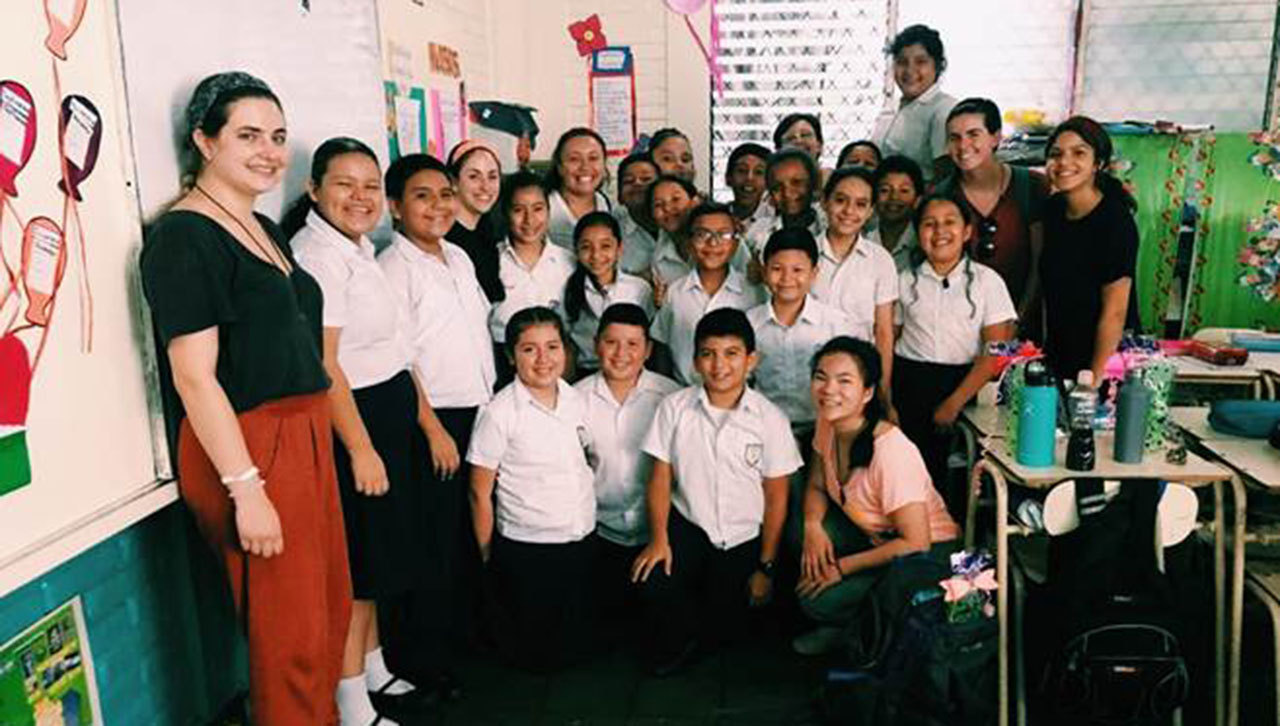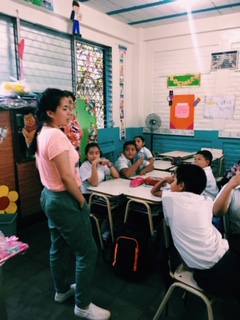Service Reflection: Building Relationships in El Salvador

Mei Lin McElhill ’20 reflects on the ISP trip to El Salvador and how it challenged her to be immersed in another culture and to be open to learning.
"I am ruined!"
On May 31, I – along with 13 amazing people from the University – had the privilege of traveling to El Salvador for a journey that would leave me speechless and ruined (in a good way). El Salvador is one of the immersion-based International Service Trips sponsored by Campus Ministries in partnership with a faith-based organization called Christians for Peace in El Salvador (CRISPAZ).
CRISPAZ focuses on building solidarity with marginalized communities whose values are reflected in foundational words such as justice, empowerment, accompaniment and solidarity. This immersion-based trip challenged me to completely immerse myself into another culture and to be open to learning.
The Homestay
On the second day in El Salvador, we traveled down a bumpy dirt road to a small community named El Papaturro. CRISPAZ made arrangements for us to be completely immersed with one of the marginalized communities, each of us staying with a host family in their residence. We paired off in groups of two, met our host families and headed to our new homes where we stayed for the next two nights. During my time at the homestay, I talked to my host, Alejandrina, played Uno and Bananagrams with two of her grandchildren – Erick, 12, and Cristian, 11 – and reflected with my roommate Mary Cate on hammocks.
My group interacted with the children during school recess learned about the sugar factory and greenhouse in the community and went to a local waterhole to swim. On our final night of the stay, we had a community dinner with our host families followed by endless rounds of soccer with the children. The games left all of us sweaty and tired, but everyone returned home with a smile.
 Getting ready to leave was hard. I had grown to enjoy my family’s presence and the welcoming attitude of the whole community. Alejandrina told Mary Cate and me that we are always welcome to return and stay with her. We hold a piece of her heart, and she would not forget us. I expressed gratitude to her, as she gave us so much. When we loaded back on the bus and started to drive away, the children ran up close to the bus to wave goodbye. This made my heart ache as I was going to miss playing with the kids and hearing their laughs.
Getting ready to leave was hard. I had grown to enjoy my family’s presence and the welcoming attitude of the whole community. Alejandrina told Mary Cate and me that we are always welcome to return and stay with her. We hold a piece of her heart, and she would not forget us. I expressed gratitude to her, as she gave us so much. When we loaded back on the bus and started to drive away, the children ran up close to the bus to wave goodbye. This made my heart ache as I was going to miss playing with the kids and hearing their laughs.
El Papaturro experiences financial poverty, however, they are rich in another sense.
Francisco Mena Ugarte, the executive director of CRISPAZ, said during a reflection: “God does not bless us with material things. He blesses us with many other gifts in life.”
El Papaturro has a blessing from God and that is the blessing of a close-knit community. Each member strives to improve not just his or her individual life but to also improve the community.
Beyond the Homestay
The rest of our trip consisted of listening to personal stories and local organizations, learning about the University of Central America (UCA), the six martyred Jesuits with Selena and Elba, the war, and the life of Oscar Romero. We visited local organizations in San Salvador, Oscar Romero’s house and chapel, the UCA, and the CRISPAZ office. We spent time at the Santa Luisa School, which received funding coming from The University of Scranton.
Finding God
Each encounter challenged me to be present and reflect deeply. Through challenging myself to reflect on a deeper level, I have found God in all aspects during my time in El Salvador.
I found God when I sat in silence at the UCA Chapel, disturbed by the facts I heard about the Salvadoran War.
I found God through the people who willingly shared their stories with trust and vulnerability.
I found God through my host family, my group, our guide Andy and our driver David.
I found God in the presence of nature.
Each day started with a beautiful sunrise and ended with a sunset, something I have truly come to appreciate.
The Meaning of Service
Now that I have returned from my trip, people ask me, “How was your trip? What service did you do?” I have a hard time answering this. I think most of my group would agree. This concept of service is something hard to explain to my family and friends.
For a long time, I struggled with this idea of service. My group was not building houses or painting a school. There was no tangible evidence of service present during or after the trip. Francisco explained, “We focus so much on serving others, so much so that we forget that people can serve us. We are all called to serve. The purpose of you being here is to establish and build relationships in El Salvador. The service begins once you return to the United States.”
To me, the physical evidence is only one aspect of a multi-dimensional definition of service. There is more depth. The meaning of service for me is more of an abstract concept. Some examples of this concept of service are long-term like promoting advocacy, standing in solidarity and educating others for change.
The Experience as a Whole
The experience I had in El Salvador has changed my heart, and it is difficult to put in words. I can write about what I did, explain where I found God, and define what service means to me, but I cannot express a single word that accurately defines my experience. I am continuing to process this experience, even two weeks after leaving the country.






